Moody Learning Space Spotlight | The Lab
Published Fall 2023
The Lab is home to the Integrated Communications Campaigns Capstone experience for senior majors at the Stan Richards School of Advertising and Public Relations School. Each class is student-led and operates exactly as a real advertising agency would with real clients to create advertising campaigns and provide strategic communication services. Through inviting corporate stakeholders who come to judge and provide feedback on student pitches, students gain authentic practice, valuable insights, and lasting connections with individuals in the industry! Visit the fourth floor of DMC to see The Lab, beautifully encased with glass.
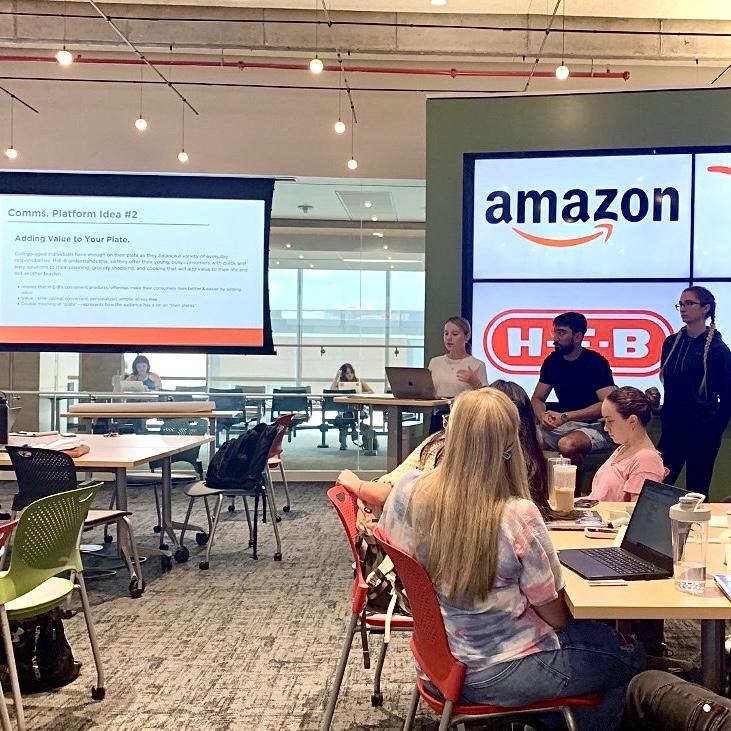
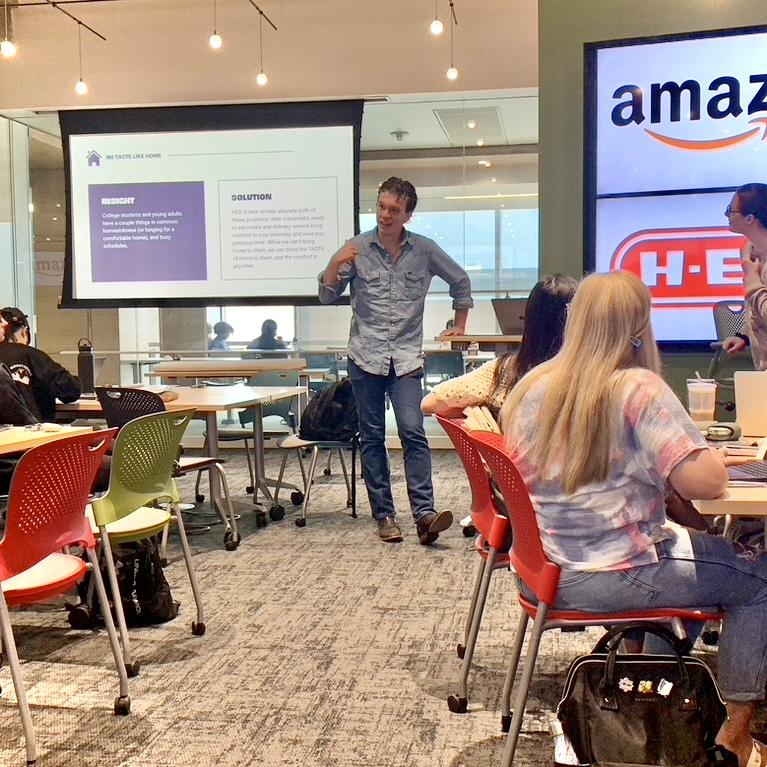
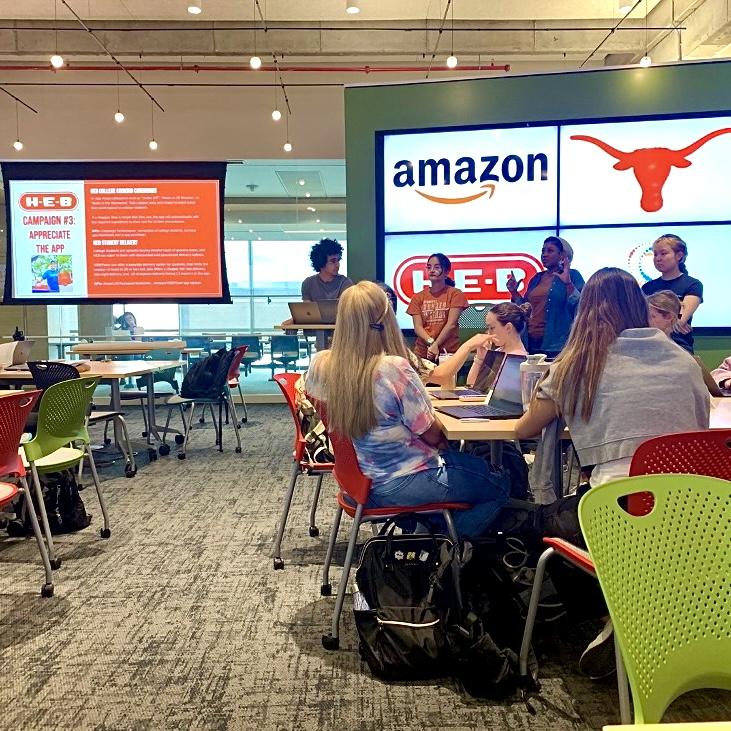
Moody Faculty Spotlight | Liza Lewis
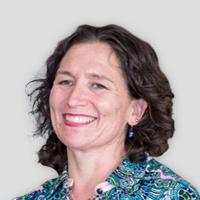
Liza Lewis is an Assistant Professor of Instruction and Program Director for The Lab, home to the Integrated Communications Campaigns Capstone experience for senior majors at the Stan Richards School of Advertising and Public Relations School. Each class is student-led and operates exactly as a real advertising agency would with real clients to create advertising campaigns and provide strategic communication services. Through inviting corporate stakeholders who come to judge and provide feedback on student pitches, students gain authentic practice, valuable insights, and lasting connections with individuals in the industry! Visit the fourth floor of DMC to see The Lab, beautifully encased with glass.
1. Can you tell us a little bit about The Lab and what happens there?
I’m the director of The Lab, which is truly the capstone experience in a very applied way. Every PR and Advertising major funnels through The Lab – They cannot graduate without it. They work with real clients that sponsor The Lab and they act as, basically, a full-service strategic communication agency. They operate exactly as an advertising agency would in the real world. Students are organized into different departments that they work in but also have to communicate with the other department groups. Students submit a survey to rank which departments they would prefer to work in and we try to get everyone into their first or second choice. So, they have a lot of control in deciding which area of expertise they want hands-on experience with. Professors coach them and guide their process throughout the semester, and by the end of the semester, they complete an entire campaign for the client. That client judges their work and, if they approve it, they may even adopt it. We try to incorporate a variety of different industries to work with, both for and non-profit. This semester, our seniors are working with HEB Corporate, Lipstone, Texas Athletics, and Amazon. We’ve also worked with big companies like Dell Technologies and Capital One, but also small local businesses in the Austin area.
2. How do you prepare for experiential learning?
The capstone class itself is not new. What is new is the experiential method. It's not always easy to get faculty to change the way they've been teaching something for 20 years, but I thought “we’ve got to change the way we teach campaigns.” What gave me the inspiration was, 6 years ago or so, I became the academic advisor for the National Student Advertising Competition (NSAC). It’s basically about creating campaigns but instead of working with a client, it’s a competition amongst schools around the country. Working with this team is what made realize I wanted to try approaching campaigns a different way. Students would have to apply to be on the NSAC team and only 5 or 6 would make the team. Instead, I wanted more students to have the opportunity to participate by creating a full agency with 35 to 40 students all working together in different departments (the account services, strategy, creative, media, and PR departments) just as they would in the real world. Their department may have 4 to 6 students, but the whole team is 35 to 40. Even though I wasn’t sure how this new method would work out, I wanted to experiment anyway. And it went extremely well! Of course, I did notice some things that needed to be changed for future semesters, but overall, students loved it! Aside from connecting with the clients and structuring the process, it's not for me to manage – The students do everything on their own and the faculty are just here to guide and observe. With the experiential learning method, the work just comes out so much better and its more realistic to what students will experience in industry
3. How do the students perceive this type of learning? What makes it engaging for them?
From the students’ perspective, their whole college journey is about getting to this class. They’ve taken all the prerequisites and they've done group projects with 4 or 5, but now they are at that point where they are understanding how to put it all together. Everything they’ve learned until now is covered in separate classes and there is a certain order they have to take them in. The Lab is where they realize all of the more theoretical things they’ve learned in their classes really do connect to practice in the real world when it comes to solving problems or realizing opportunities for clients. They put all that prior information together to create something new and they get going right away! Right as the semester begins, they’ve got to get started to have a finished campaign by the end. They’ve got to do primary and secondary research for the first 4 or 5 weeks. Then the client comes back in and has to approve the overall strategy before they can continue actually making the campaign.
During the first 2 hours of the 3-hour class, they work on the campaign. For the last hour, they connect with a professor who has expertise in whichever department they are working in and have a coaching session. That’s where they can get more specialized help with any problems they’re running into or just confirm that they’re on the right track.
This experiential learning method is not perfect in the sense that there are going to be bumps. But I’ve found that all of the bumps that come along are the same ones that pop up in industry. These bumps aren’t happening because they’re students, but because that’s just the nature of the work and they’re getting experience with that before they even graduate! One of the biggest skills students learn from this experience is just how to work with other people. They learn how communicate with each other and others in a professional way. To point out a problem or offer an evaluation isn’t easy, but they have to learn how to talk about these things in a positive way.
4. How do you go about making connections with the clients?
This is the fun part for me because a lot of the process hinges on connections I’ve made with students! I get to re-connect both with folks I’ve met from the university and in the industry. I’ve been teaching for about 20 years now, so I have the opportunity to reach out and catch up with alumni because, 10 years after they’ve been my student, they’re now directors themselves! They’re still using what they’ve learned in class and they can give me insight into the current climate of industry and what industries are looking for. The Lab also has gained a unique reputation that some clients reach out to me. Former students who have graduated have also connected their company with us. The clients really do get so much from our students that they just want to donate and contribute the program. Fostering the connection is just as beneficial for them as it is for us because it’s like having a full agency working just for you and thinking about your problem or opportunity for a whole semester – that’s a lot of dedicated effort and the clients like that!
5. Do you have any tips for how to implement experiential learning practices in other classes?
I think instructors need to understand the needs of the industry and what skills the students need for that particular major. Whether it's journalism or RTF or any other department, the university has to keep up with and foster connections with industry. I always keep up with my students and even help them find jobs or learn how to network or negotiate salaries. I also keep up with colleges just to ask: “Hey, what are you looking for right now, what skills are missing in the industry?” We're not a trade school because we do so much more and that’s important, but we do need to understand what industry needs so students can be successful when they finish. Students want to be able to be ahead of the game in terms of skills. When they apply for positions, they can show what they made in this class. So, understand what the industry wants and try to give the students projects that can directly transfer to whatever they want to do after graduation.
I would also recommend only doing this kind of complex experiential learning with seniors – maybe juniors at most. Students can’t necessarily come up with the best solutions until they’ve taken all the basic courses, gone through some internships, and have just more life experience in general because students bring everything in – How they grew up, all their courses, all their connections with other people, etc. All of these things influence how someone can creatively solve problems and opportunities. At the freshman and sophomore levels, I think it’s great to prepare for something like The Lab by working in small groups for a pretend client – but they’ve got to get the basics down before they can experience the full thing. In other fields, for example, pharmacists can’t distribute medical formulations until they’ve completed all of their rotations. While the stakes here aren’t life or death, the same principle applies.
6. Any final thoughts on how the lab contributes to the Moody college experience?
For Advertising and PR majors, this is the Moody experience for them. It’s the zenith; it’s the icing on the cake; it’s the peak of the mountain that they’ve been climbing. Throughout their whole college journey, they’ve been wondering: “Why am I learning this? Why am I taking this test or these classes?” Here it finally starts coming together with work for a real client. It can be scary because it’s a lot of hard work and the clients aren’t afraid to be honest about the pitches they hear, but that’s also what makes it exciting. They get experience not just with the work for the client, but also just working out what career paths they want to try. They have the chance to figure out if this is something they want to do – working for an agency or maybe they want to go work for a nonprofit, etc. There are no other programs really like this except for maybe MBA graduates. For undergraduates, The Lab at Moody is where they get experience no other school can offer.
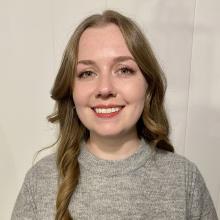
Rheanne Pecsenye, Program Coordinator for The Lab
1. What is your role at The Lab? Describe your typical day working day.
I am the Program Coordinator for The Lab where I work with faculty and students to support their capstone course. A typical day for me is to reserve rooms in The Lab for people who need to use it, post on social media for any upcoming events, and email with students to support with their class registration and purchasing needs for current ICC students. Additionally, I work closely with the clients that Dr. Lewis procures for The Lab, and I support them to ensure they are set up for success when collaborating with the students and professors.
2. In what ways does The Lab experience allow students to connect with each other, faculty/TAs, industry professionals, etc.?
The Lab experience is a great way for students to connect with a host of people. In class, students are divided into different departments based on the track they want to pursue in their industry. Each week they attend a one-hour coaching session with students from different classes in the same department, and depending on their schedule, the coaching session can be taught by a different professor. Students have a lot of opportunities to connect with industry professionals, not only through their capstone course, but with different events that are held almost weekly. The fact that students are working on real campaigns for clients and not just doing a mock, is such a great experience for them.
3. What’s your best/favorite experience associated with work in/at The Lab?
I am still new to my role and The Lab, but my best experience working with The Lab thus far has been when the strategy team of Professor Lewis’ class presented their campaign strategy to the client. It was fun to see all the hard work the students had put in thus far in the semester come to fruition and to have them get live feedback from executives was so great to see. I’m very much looking forward to their final pitch and eventually seeing their campaign in real life down the road.
4. What do you want faculty, grad students, undergrads, etc. to know about The Lab?
The Lab is an amazing space to hold events, you can advertise for clubs, speakers, etc. with the TVs posted outside The Lab, and there are always lots of great opportunities for networking happening. If you are a student, I highly suggest taking your ICC capstone course in the Fall/Spring semesters to have the best experience working with a client.
5. Any final thoughts on working at The Lab or how The Lab contributes to the Moody College Experience?
I love working for The Lab and everyone has been so helpful and gracious; supporting students, faculty, and staff with The Lab has been very rewarding. The Lab is such a unique concept... It is unlike anything else. The benefits of The Lab are not just for the students who take the capstone course, but the rest of Moody College as well. There are so many recruiting opportunities and information sessions that students can attend and build their network of prospective employers.
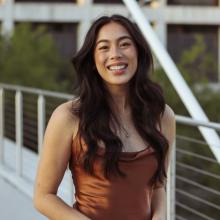
Emily Hoppie, UT Alumni & Former Teaching Assistant for The Lab
1. Describe a typical graduate student day working at The Lab.
A typical day working at The Lab as a graduate student consisted of many different aspects. As a graduate student, I had to wear many different hats. I was a student, an employee, and somewhat of an authority figure. In addition to my job as a TA at The Lab, I typically had 2 classes a day and I had a part time remote job as a social media manager. On the days I had my TA class, I liked to come to campus early, work on projects for my creative classes, and get ahead on some work. During the TA class, I would take attendance, provide feedback, and answer questions if any came up. Outside of the class, I worked on assignments to progress The Lab. This entailed conducting research on competitors, making graphics for The Lab, planning out future website content, and designing a logo and other assets for The Lab. I also met with Dr. Lewis once a week. In that meeting, we would discuss the class and I would update her on the progress I made on The Lab assignments.
2. In what ways does The Lab experience allow students to connect with each other, faculty/TAs, industry professionals, etc.?
In no other course does a whole class work together in the same fashion an agency would. The Lab allows students to collaborate with faculty/TAs and one another on a weekly basis. By setting up the course to be structured like an agency, it really allows for students to get out of their so-called “silos” and connect with classmates that they otherwise wouldn’t have. The Lab is built to set students up for success and really prepare them to go into the industry. Not only are the professors always willing to help students and give guidance, but The Lab even provides many networking and learning opportunities. While I was there, The Lab brought in alumni and industry professionals to speak about their experiences within the workforce, provide insight and guidance, and answer any questions the students had.
3. How did working in The Lab influence your own views on teaching or your teaching style? How do you see your experience of working with The Lab connecting with your overall career path?
Pretty much all of the professors and faculty that taught in The Lab were at some point successful in the advertising industry. They were all students at one point and they made their way to success. I am inspired by the professors and their desire to give back and help students like me. Their desire to help teach, provide opportunities, and guide the way for students just makes me want to do the same one day for incoming young professionals starting their career in the industry.
4. What do you want students to know about The Lab?
The Lab is such a great resource for students when taken advantage of. It is possible to just go through the motions, attend class, and then leave. However, making an effort to utilize all that The Lab has to offer, like speaking to professors, attending the “lunch and learns” with industry professionals, and taking the class seriously, will set you up for success in the future.

